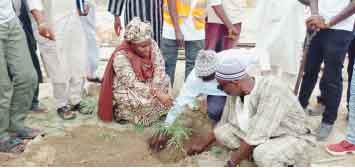by Isatou Jawara
The Minister of Environment Climate Change and Natural Resources Hon Rohey John Manjang recently concluded six-day nationwide familiarisation tour that enabled the Minister visit regional forestry stations and various project intervention sites in North Bank Region (NBR), Lower River Region (LRR), Central River Region (CRR), and Upper River Region (URR).
The Minister visited project intervention sites, met with regional forestry staff and various agro forestry farmers.
The Ministry is expected to develop a roadmap that will identify programmes, plans that will address the challenges and devise the way forward.
Minister John Manjang and delegation visited Essau community women’s group project in which more than 300 women benefited from cooking stoves. The initiative is funded by ERDP Project through UNDP.
During the visit, the women thanked the Ministry through the ERDP Project for this important initiative for the community, who now benefit from a low-cost energy, which is contributes to poverty reduction.
The delegation later proceeded to Bassick Niumi Community Forest, where the community engages in income-generation activities like honey production and processing of local forestry products.
The other place visited was Baja Kunda Lower Basic and Senior Secondary Schools, who are implementing the Green School Tree Planting Programme, initiated by EbA Project. The project targets schools within rural communities in CRR, URR and LRR. Ten schools in CRR South benefitted from small grants to grow trees. The piloted schools include: Sinchu Madabo Primary School, Jawo Kunda Primary School, and Niamina Dankunku Primary School.
The tree-planting initiative aims to raise students’ understanding of the benefits of growing trees and environmental at large.
Speaking to Ms. Kumba Jallow, one of the teachers at Baja Kunda Lower and Upper Basic School, she acknowledged that planting trees and environmental education help students become aware of the benefits of growing trees. “They can play a big role in protecting the environment. The experience will help them understand conservation and the use of our natural resources”.
Sarjo Jawara, one of the Agro-forestry farmers at Tambasangsang Village, URR, said that the project provided seedlings for the communities in this year’s rainy season. She however expressed the need for support in terms of farm implements and boreholes.
“Most women gardeners are affected during the rainy season. The gardens get flooded”.
The Honorable Minister was accompanied by the Permanent Secretary, Mr. Lamin Sanneh; Deputy Permanent Secretary Technical, Baboucarr Zaidi Jallow; Director of Forestry, Mr. Muhammed Jaiteh; Project Manager EbA; and other senior officials from departments and agencies under the ministry.







